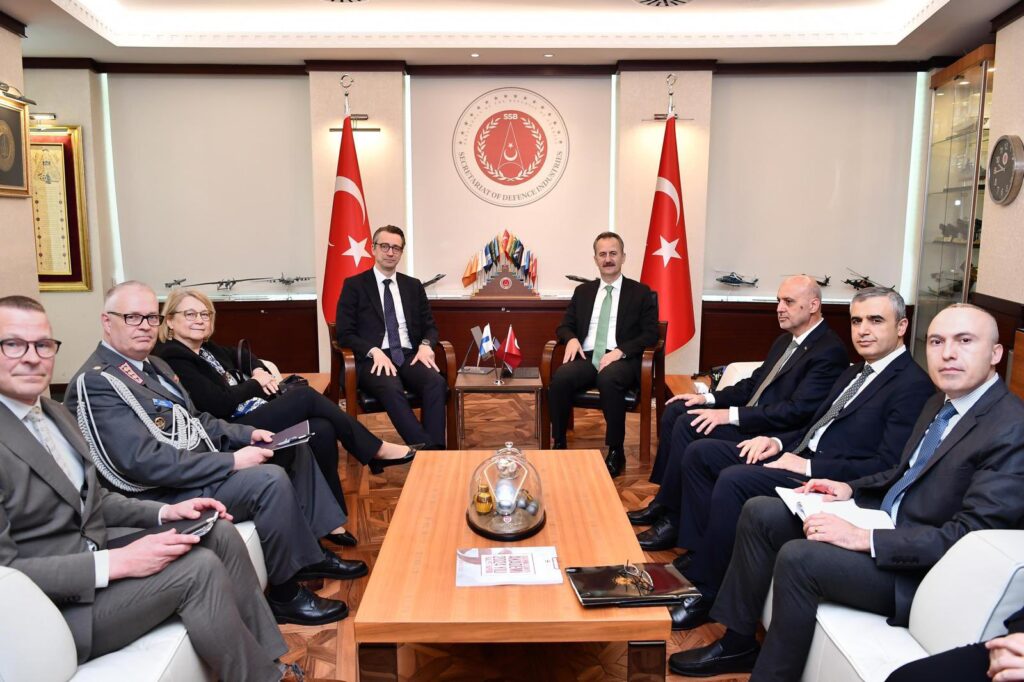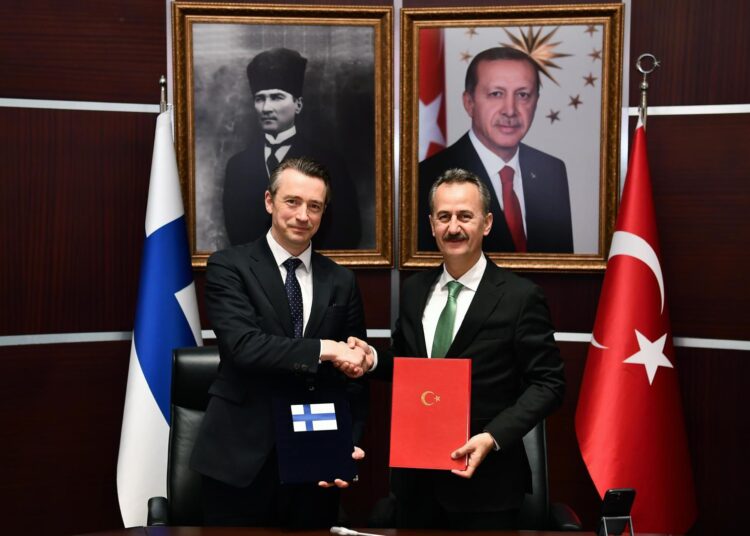Levent Kenez/Stockholm
Turkey and Finland have signed a defense industry cooperation memorandum of understanding (MOU), marking a formal step to enhance collaboration in such areas as joint production and technology exchange within the NATO framework.
The agreement was signed on June 2, 2025, in Ankara by Haluk Görgün, head of Turkey’s Presidency of the Defense Industry, and Olli Ruutu, Finland’s director general of resource policy and national armaments director. It aims to facilitate joint production, technology transfer and capability development between the two countries.
“This memorandum opens the door to a new era in areas such as co-production, technology sharing and capability enhancement,” Görgün wrote on X. He added that the agreement would support NATO’s deterrence and contribute to Europe’s defense industry integration.
The MOU follows a complex NATO accession process in which Turkey played a key role. Initially hesitant about Finland and Sweden joining the alliance, Turkey differentiated between the two countries. On March 30, 2023, the Turkish Parliament ratified Finland’s NATO membership, becoming the final member to approve its accession, months before doing the same for Sweden.
Turkey’s earlier approval of Finland’s NATO membership was widely interpreted as a tactical move. Analysts pointed out that Finland, unlike Sweden, had not imposed a formal arms embargo on Turkey and was therefore perceived more favorably during accession talks. Observers also suggested that Ankara may have aimed to differentiate between the two Nordic countries to strengthen its negotiating position and obtain additional concessions.

Finland’s interest in Turkey’s defense technology predates this latest agreement. In 2022 then-foreign minister Pekka Haavisto suggested that Finland might consider purchasing Turkish military drones such as the Bayraktar TB2 if it became a NATO member. The drones are produced by Baykar, a Turkish defense contractor co-founded by Selçuk Bayraktar, who is married to President Recep Tayyip Erdogan’s daughter. “There are technologies in Turkey that interest Finland,” Haavisto said. “Everyone is following these drones and systems.” While he stressed the need for careful consideration, the remarks were widely interpreted as an effort to maintain constructive dialogue with Ankara during a delicate stage in Finland’s NATO accession process.
The new memorandum could open the door for such purchases, particularly as Finland accelerates efforts to modernize its armed forces in response to growing concerns over Russian aggression.
Since Russia’s full-scale invasion of Ukraine in 2022, Finland, which shares a 1,340-kilometer border with Russia, has increased its defense budget significantly. According to NATO and the Stockholm International Peace Research Institute (SIPRI), Finland’s military expenditure rose by 18 percent in 2023 to reach €6 billion ($6.4 billion), one of the steepest year-on-year increases in Europe. The country has also resumed large-scale military exercises and strengthened its integration into NATO command structures.
Turkish defense contractors including Aselsan, STM and Armelsan participated in the Navy Tech 2025 exhibition held in Helsinki February 11-13. Their presence highlighted Turkey’s aim to expand its footprint in Northern Europe’s defense market.
Economic ties are also expanding. The second meeting of the Turkey-Finland Joint Economic and Trade Committee (JETCO) was held in Helsinki on Fabruary 18. Finnish Minister for Foreign Trade and Development Ville Tavio hosted the Turkish delegation led by Minister of Trade Ömer Bolat. Business representatives from both sides discussed cooperation in areas including sustainable textile production, achieving carbon neutrality in the steel industry and infrastructure opportunities in the Middle East, Central Asia, Africa and Southeast Asia. These talks reflect a mutual intent to deepen economic ties in parallel with defense and technology cooperation.
As of the end of 2024 Finland ranked as Turkey’s 22nd largest export market among EU countries. During this period, the bilateral trade volume exceeded $1.7 billion.
Finland’s decision to strengthen cooperation with Turkey is seen as both strategic and geopolitically sensitive. With a long shared border with Russia and given Moscow’s wariness of NATO expansion, closer military-industrial ties between Finland and Turkey are likely to be closely observed by the Kremlin.
Finland has repeatedly expressed concern about increased Russian activity near its border. Satellite images taken at the end of May showed expanded Russian military infrastructure close to the Finnish frontier. The images revealed tents, military vehicles, renovations of fighter jet shelters and construction at a previously unused helicopter base. Maj. Gen. Sami Nurmi, who oversees preparations for the Finnish Defense Forces, said, “They are changing their structures, and we see moderate preparations for infrastructure construction near our borders. This indicates that once the war in Ukraine ends, they will likely begin redeploying ground forces.”












